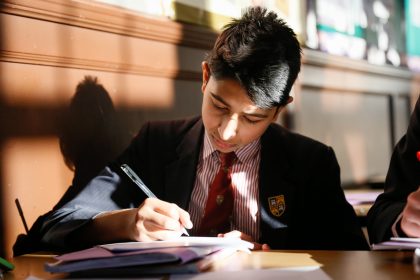We’ve talked a lot in recent assemblies about taking risks – ‘deep breath and stick your neck out’ – in order to achieve something meaningful in life. Large numbers of prospective BGS students have been brave and done just that by virtue of sitting our entrance test and joining us for interviews these past weeks.
The results are now in and we have the great privilege of being able to make offers to many talented and lovely children that we are genuinely excited about teaching in the future. But no one is pretending that the selection process for a school like BGS is easy – it isn’t. There are risks involved, it takes courage to apply and we respect those who do.
In the UK our relationship with risk has become a rather complex and highly regulated one, particularly in schools. But turn the clock back, to a damp Thursday morning in the Autumn of 1987, and you’d find me, a young fourth year (or Year 10 nowadays) pupil scrambling up Burbage Brook near Hathersage in the Peak District with my school’s outdoor education group.
Garbed in traditional bright yellow, cardboard-stiff waterproofs, we had great fun getting soaked in the birch woods whilst clambering up-stream, over gritstone boulders, to get to the school minibus where hot chocolate was awaiting. But Burbage Brook narrows into craggy V-shaped cuts in places and a fallen tree had made a natural bridge.
‘Who wants to cross the tree?’ asked our teacher rather enthusiastically, and I bounded off to have a crack at it, fully expecting to be part of a noisy, confident crowd. However, there was only one of my friends who stepped up to the challenge with me. The tree was old, mossy and damp and the brook was some ten metres or so below, without a soft landing. A fall would have made life very interesting and possibly quite short all things considered, but peer pressure and pride made it hard to turn back.
My question to parents reading this is: how would you judge my teacher? What if your child was in my position wearing those day-glow, outdoor education sowesters and slippery, ill-fitting wellies?
Editorials and blogs of recent days reflecting our national sympathy at the death of Antarctic adventurer Henry Worsley have made me think about experiences like these and the role of schools to educate young people about risk. One story in the Times ‘When Charity begins at Kilimanjaro’ got under my skin. The article drew a clear distinction between good old fashioned high risk adventuring and the not so good modern fashion for ‘production-line Kilimanjaro hikes’ which devalue the word ‘expedition’.
I have some empathy with this argument given my experience of shoe-string, do-it-yourself, summers in the Alps and home-grown trips to climb the lower lying Himalayan peaks like Imja Tse with my better half. I’ve even put together scratch expeditions for schools to places like the Picos de Europa, Northern Spain, sticking steadfastly to the age old adventurer’s code of self-sufficiency and independent travel.
However, I’ve also been fortunate to work with excellent professional expedition companies and helped to lead successful alpine-style attempts on peaks such as Cotopaxi in Ecuador, Nevada Pisco in Peru and – (yes) – even the non-technical but tough nonetheless Kilimanjaro in Tanzania. What I’ve learnt is that none of these ventures is without hazard. To characterise company-lead adventure as ‘safe’ does not do justice to the risks that participants embrace, or the immense sense of achievement and self-knowledge that builds when hard won goals and distant summits are reached.
As a teacher who shares his passion for the great outdoors with others, be it on far flung mountains or local crags and hill tops, I’d like to reassure those who think that we educators wrap kids up in cotton wool, bound by health and safety red tape, that this isn’t the truth in many schools. Balance exists. We teach young people how to navigate risk. We foster awareness, resilience and confidence, and build character – and not just in outdoor settings but in classrooms and exam halls too.
So, back to that fallen tree: should I have known better? After all I understood risk and never took up the offer of one particular teacher to play football in the fast lane of the nearby M1 when my attention wandered in one of his lessons. Should a teacher have encouraged us to cross the gulf of Burbage Brook in the wet? Would I allow it now as a Headmaster? Would you?
“The results are now in and we have the great privilege of being able to make offers to many talented and lovely children that we are genuinely excited about teaching in the future. But no one is pretending that the selection process for a school like BGS is easy – it isn’t. There are risks involved, it takes courage to apply and we respect those who do.”
